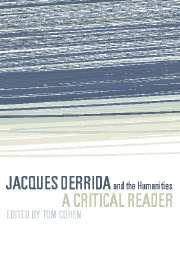Book contents
- Frontmatter
- Contents
- Preface
- Acknowledgements
- Biographical chronology
- Introduction: Derrida and the future of …
- Chapter 1 The future of the profession or the university without condition (thanks to the “Humanities,” what could take place tomorrow)
- Chapter 2 Derrida and literature
- Chapter 3 Derrida and gender: the other sexual difference
- Chapter 4 Derrida and aesthetics: Lemming (reframing the abyss)
- Chapter 5 Derrida and representation: mimesis, presentation, and representation
- Chapter 6 Derrida and philosophy: acts of engagement
- Chapter 7 Derrida and ethics: hospitable thought
- Chapter 8 Derrida and politics
- Chapter 9 Derrida and law: legitimate fictions
- Chapter 10 Derrida and technology: fidelity at the limits of deconstruction and the prosthesis of faith
- Chapter 11 Derrida and history: some questions Derrida pursues in his early writings
- Chapter 12 Derrida and psychoanalysis: desistantial psychoanalysis
- Glossary
- Index
- References
Chapter 10 - Derrida and technology: fidelity at the limits of deconstruction and the prosthesis of faith
Published online by Cambridge University Press: 22 September 2009
- Frontmatter
- Contents
- Preface
- Acknowledgements
- Biographical chronology
- Introduction: Derrida and the future of …
- Chapter 1 The future of the profession or the university without condition (thanks to the “Humanities,” what could take place tomorrow)
- Chapter 2 Derrida and literature
- Chapter 3 Derrida and gender: the other sexual difference
- Chapter 4 Derrida and aesthetics: Lemming (reframing the abyss)
- Chapter 5 Derrida and representation: mimesis, presentation, and representation
- Chapter 6 Derrida and philosophy: acts of engagement
- Chapter 7 Derrida and ethics: hospitable thought
- Chapter 8 Derrida and politics
- Chapter 9 Derrida and law: legitimate fictions
- Chapter 10 Derrida and technology: fidelity at the limits of deconstruction and the prosthesis of faith
- Chapter 11 Derrida and history: some questions Derrida pursues in his early writings
- Chapter 12 Derrida and psychoanalysis: desistantial psychoanalysis
- Glossary
- Index
- References
Summary
It could be argued that since 1967 Jacques Derrida has elaborated deconstruction within the context of an unprecedented development in technology – the development, that is, of the amalgamation of technics with science in the field of industry. A context in which “the future can only be anticipated in the form of an absolute danger and can only be proclaimed as a sort of monstrosity.” And a technology that constitutes something like an “objective” – that is to say, factual – “deconstruction.” In 1967 the world, divided between “East” and “West,” was still in the process of enjoying the post-war years of prosperity; and the “movement” of 1968 that was to disturb the apparent harmony of this economic growth continued to affirm, ultimately, a basic trust in the emancipatory power of social history.
In 1997 it is loss of trust and “monstrosity” that now dog the most routine experience. Many ghosts haunt the world, but one is more haunting than all the others: the crisis in faith, loss of “credit,” an experience of “kenosis” – that is, the emptying out of God in the incarnation and the experience of emptiness, in turn, that this emptying induces – pushed to the limit, and what tries to answer this crisis in the way of “belief” or “fidelity.” And yet belief and fidelity today assume such a convulsive form as to do nothing but announce the imminent advent of total incredulity and infidelity.
- Type
- Chapter
- Information
- Jacques Derrida and the HumanitiesA Critical Reader, pp. 238 - 270Publisher: Cambridge University PressPrint publication year: 2002
References
- 17
- Cited by



